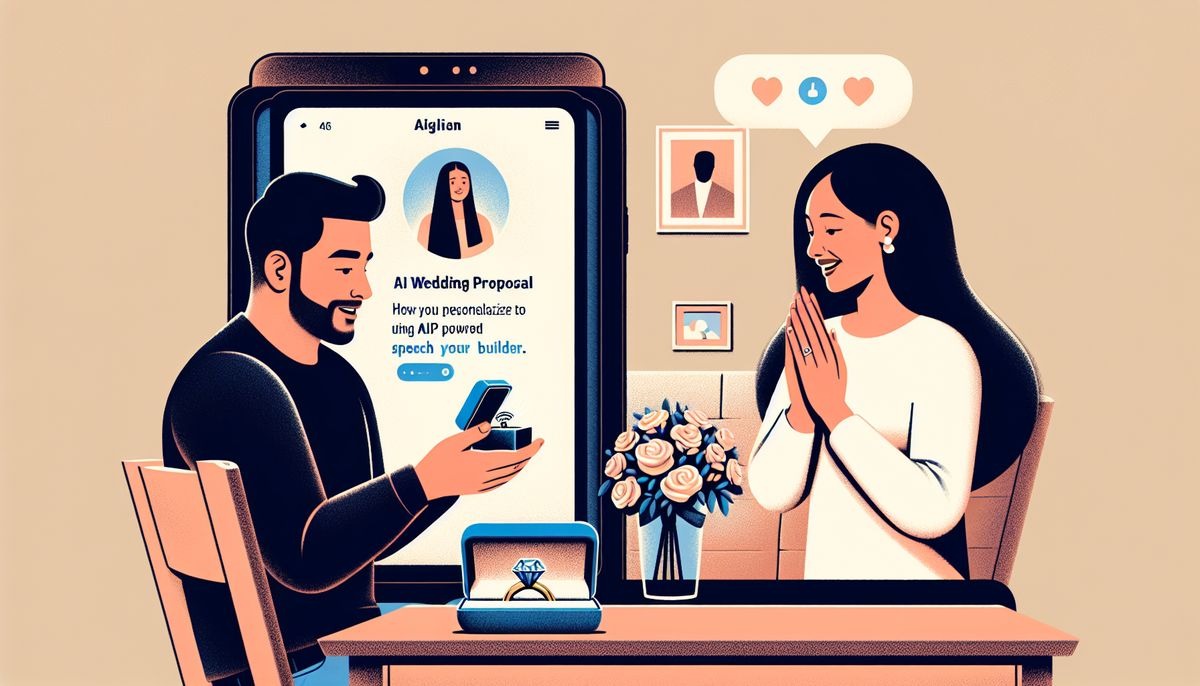Perfect Wedding Speech A Guide for Bridesmaids & Groomsmen
As a bridesmaid or groomsman, delivering a speech can be one of the most significant contributions to the wedding celebration. This guide provides essential tips and strategies for creating and delivering a speech that will resonate with the audience, honor the couple, and ensure a memorable experience. From crafting the right balance of humor and sentiment to overcoming public speaking nerves, this article will help you navigate the journey of giving the perfect wedding speech.
Key Takeaways
- Understand your audience to tailor your speech for maximum engagement and impact.
- Strike a balance between humor and sentiment to capture the essence of the occasion.
- Structure your speech effectively to maintain interest and deliver a powerful message.
- Incorporate personal stories and anecdotes to create a heartfelt and memorable speech.
- Prepare and practice thoroughly to overcome public speaking jitters and deliver with confidence.
Crafting the Ideal Speech: Tips for Bridesmaids and Groomsmen
Understanding the Audience
When stepping up to deliver a speech at a wedding, it’s crucial to recognize the unique blend of individuals in attendance. The audience often spans generations, with varying degrees of familiarity with the couple and differing expectations for the occasion. To ensure your speech resonates, consider these key points:
- Demographics: Age, cultural backgrounds, and the relationship to the couple can influence the type of content that will be well-received.
- Interests: Aligning your speech with the general interests of the guests will keep them engaged.
- Event Context: The formality of the event should guide the tone of your speech.
Crafting a speech that acknowledges these aspects creates a connection with the audience, making your message more impactful.
Remember, the goal is to enhance the celebration, not to overshadow it. Striking the right balance between personal anecdotes and universal themes will make your speech a memorable part of the couple’s special day.
Balancing Humor and Sentiment
Crafting a speech that perfectly balances humor with sentiment is like walking a tightrope; it requires finesse and a keen understanding of your audience. Start by considering the shared experiences and memories that resonate with everyone. A touch of humor can lighten the mood and make your speech more relatable, but it’s crucial to keep it tasteful and inclusive.
- Understand the Couple: Reflect on what makes their relationship unique and draw from that.
- Read the Room: Gauge the audience’s reaction and adjust your tone accordingly.
- Mix Anecdotes and Insights: Pair funny stories with heartfelt moments for a well-rounded speech.
Remember, the goal is to celebrate the couple and their love story, not to perform a stand-up routine. Striking the right balance will leave a lasting impression and honor the significance of the occasion.
Lastly, be mindful of the pacing. Humor can serve as a delightful interlude between more profound sentiments, but it should never overshadow the heartfelt message you’re there to deliver. Keep your speech authentic, and let your genuine affection for the couple shine through.
Structuring Your Speech for Impact
The key to a memorable speech lies in its structure. Begin with a strong opening that captures attention; proceed with a well-organized body where personal stories and meaningful messages intertwine; and conclude with a powerful ending that leaves a lasting impression. Here’s a simple outline to follow:
- Introduction: Set the tone and establish a connection.
- Main Content: Share anecdotes, celebrate the couple, and weave in humor.
- Conclusion: End with heartfelt wishes and a toast to the future.
Remember, a speech is more than words; it’s the delivery of emotions and connections. As you craft your speech, consider the following:
Your speech is a bridge between you and the audience, a shared journey of laughter and sentiment. It’s an opportunity to honor the couple and their story, making every word count.
Lastly, practice is essential. Rehearse your speech to refine your delivery, ensuring that when the moment comes, you speak not just to the ears, but to the hearts of all present.
Personalizing Your Message: Making it Memorable
Incorporating Personal Stories
Personal stories are the heart of any memorable bridesmaid or groomsman speech. They provide a unique glimpse into your relationship with the couple and can evoke a range of emotions from the audience. When selecting stories, aim for those that highlight the couple’s qualities and shared moments that everyone can appreciate.
- Select Relatable Stories: Choose anecdotes that the majority of guests can connect with, avoiding overly private details.
- Explain Inside Jokes: If you include personal references or inside jokes, briefly provide context so all guests can enjoy the humor.
- Balance Emotions: Mix humor with sentiment to create a well-rounded speech that resonates with the audience.
Remember, the goal is to celebrate the couple’s journey and your part in it, not to embarrass or overshare. Crafting your speech with care will ensure it’s both personal and appropriate for the occasion.
Finally, actively involve the audience when possible. This could be as simple as a collective toast or a prompt for guests to share their own memories. Such engagement not only enriches the experience but also creates a sense of community and celebration.
Connecting with the Couple
When delivering a speech as a bridesmaid or groomsman, the essence of your connection with the couple is what will truly resonate with the audience. Start by introducing yourself and explaining your relationship with the couple, providing context for your shared history.
- Introduce yourself and your relationship to the couple
- Share one to three short anecdotes that highlight your bond
- Express genuine affection and admiration for both individuals
Remember, the goal is to illustrate the unique dynamic you share with the couple, which has earned you the honor of speaking on their special day. It’s not just about recounting memories, but also about conveying the depth of your friendship and the qualities you admire in them.
Your speech should be a mirror that reflects the love and respect you hold for the couple, showcasing why their union is celebrated.
Conclude with heartfelt wishes for their future, tying back to the personal stories and attributes you’ve highlighted. This approach ensures your speech is not only memorable but also a sincere tribute to the couple’s journey together.
Using Quotes and Anecdotes Effectively
Incorporating quotes and anecdotes into your speech can significantly enhance its emotional resonance and memorability. To ensure that every guest can follow along, it’s advisable to provide context for any personal references or inside jokes. A brief explanation can make these elements inclusive, ensuring that even someone’s plus-one or distant relative can appreciate the humor and sentiment.
When selecting quotes or anecdotes, aim for those that are universally relatable and avoid sharing overly intimate details that might cause discomfort. Here’s a simple structure to follow:
- Choose a quote or anecdote that aligns with the couple’s story.
- Provide context to make it accessible to all guests.
- Tie it back to the broader theme of your speech.
Remember, the effectiveness of a quote or anecdote is not just in the content but in how it’s woven into the narrative of your speech. It should feel like a natural extension of your message, enhancing the overall experience for the audience.
Lastly, the opening of your speech sets the tone. Begin with something captivating, whether it’s a humorous quip or a touching story, and ensure that it balances well with the rest of your message. The goal is to engage your audience from the very first moment and leave them with a lasting impression.
Overcoming Public Speaking Jitters
Preparation Strategies
Mastering the art of public speaking begins long before you step up to the microphone. Preparation is key to delivering a speech that resonates with the audience and leaves a lasting impression. Start by writing down your speech and practicing it aloud multiple times. This not only helps you memorize the content but also allows you to work on your delivery and timing.
A well-rehearsed speech is like a map during a journey; it guides you through your narrative and ensures you don’t lose your way.
Remember to bring a printed copy of your toast to the event. Reading from a physical paper is preferable to a phone, as it avoids the unflattering light cast by electronic devices, which can detract from the moment in photographs. Additionally, consider the following steps to enhance your preparation:
- Envision potential scenarios and plan for unexpected situations.
- Create a solid structure for your speech to maintain organization.
- Adjust your speech’s timing and content on the fly if needed.
- Maintain a calm demeanor and use humor to navigate disruptions.
By investing time in these preparation strategies, you’ll be able to deliver your speech with confidence and authenticity, making it a memorable part of the wedding celebration.
Breathing Techniques for Calmness
Before stepping up to deliver your speech, it’s crucial to center yourself with calming breathing techniques. Start by taking slow, deep breaths to steady your heartbeat and relax your muscles. Inhale through your nose, allowing your diaphragm to expand, and exhale through your mouth, releasing any tension.
By focusing on your breath, you create a moment of stillness that can anchor you amidst the nerves and excitement of the occasion.
A simple breathing exercise to try is the 4-7-8 method:
- Inhale for 4 seconds.
- Hold your breath for 7 seconds.
- Exhale for 8 seconds.
Repeat this cycle four times to help reduce anxiety and improve focus. Remember, the key to a successful speech is not just the words you say, but also the composure with which you say them. Embrace these moments of quiet to prepare yourself for a memorable delivery.
Practicing for Confidence
The adage ‘practice makes perfect‘ is particularly true when it comes to delivering a speech. Rehearsing your speech multiple times before the big day can significantly boost your confidence. Start by practicing in front of a mirror to get comfortable with your expressions and gestures. Then, move on to rehearsing in front of friends or family members who can provide constructive feedback.
- Rehearse in front of a mirror: Get comfortable with your body language.
- Practice with an audience: Gain confidence by speaking to a small group.
- Memorize key points: Ensure you can deliver the main parts of your speech without notes.
- Personalize your speech: Make it your own to feel more connected to the content.
- Keep it simple: Don’t overwhelm yourself or the audience with too much information.
By internalizing the content and structure of your speech, you’ll be able to deliver it more naturally and effectively. Remember, the goal is not to memorize every word, but to be familiar enough with your speech that you can convey your message with ease and authenticity.
The Dos and Don’ts of Wedding Speeches
Appropriate Content Guidelines
When crafting a wedding speech, it’s crucial to tread the line between personal and public. Your words will echo not just in the hearts of the couple but also in the memories of all present. Here are some guidelines to ensure your speech is both touching and tasteful:
- Respect Privacy: Share stories that celebrate the couple without revealing private details that may cause discomfort.
- Universal Appeal: Choose themes and anecdotes that resonate with a wide audience, ensuring inclusivity.
- Language and Humor: Be mindful of your language and humor. What’s funny in a private setting may not be suitable for a diverse wedding audience.
- Cultural Sensitivity: Acknowledge and respect the cultural backgrounds of the couple and the guests.
Remember, a wedding speech is a blend of warmth, wit, and wisdom. It’s a moment to uplift, not to unsettle.
Lastly, consider the impact of your words. A speech is not just a sequence of stories but a narrative that weaves together the couple’s journey with the joy of the occasion. Aim for a balance that honors the couple and entertains the guests, leaving everyone with a smile and a fond memory.
Timing Your Speech Right
The length and timing of your speech can significantly influence its reception. Aim for a duration that is long enough to express your sentiments but short enough to keep the audience engaged. As a general guideline, wedding speeches should last between 3 to 5 minutes. Here’s a quick breakdown to help you manage your time effectively:
- Introduction: 30-45 seconds
- Main Content (stories, anecdotes): 2-3 minutes
- Conclusion (toasts, well-wishes): 30-45 seconds
Remember, speaking too fast can make it difficult for guests to follow, while dragging on can lead to a loss of interest. Practice your speech to get a sense of timing, and don’t be afraid to trim parts that feel too lengthy.
Pro Tip: If you’re prone to nervousness, you might rush through your speech. Counter this by consciously slowing down and pausing for effect. This not only helps with nerves but also allows your message to resonate more with the audience.
Lastly, be adaptable. If the event is running behind schedule, be prepared to shorten your speech without compromising its core message. And if you’re following other speakers, adjust your content to avoid repetition and maintain the audience’s attention.
Engaging the Audience
To truly captivate your audience, it’s essential to transform your speech from a monologue into a dynamic dialogue. Engage guests by inviting them to participate, perhaps through a collective toast or a moment of reflection about the couple. Here are some effective ways to involve your audience:
- Address individuals directly: Recognize family members or friends with a personal note or shared memory.
- Interactive elements: Include activities like passing the microphone for others to share short well-wishes.
- Audience participation: Encourage guests to partake in a symbolic gesture, such as lighting a candle for the couple.
Remember, the goal is to create an inclusive atmosphere where everyone feels a part of the celebration, not just spectators.
Incorporating these elements not only enriches the experience but also ensures that your speech will be remembered as a highlight of the celebration. Keep in mind the demographics and cultural backgrounds of your audience to tailor your approach for maximum engagement.
After the Applause: Post-Speech Considerations
Handling Reactions Gracefully
After delivering your speech, the audience’s reaction can range from thunderous applause to a more subdued response. Regardless of the outcome, it’s important to handle reactions with grace and professionalism. Here are a few tips to keep in mind:
- Acknowledge the audience: A simple nod or a thank you can go a long way in showing your appreciation for their attention and response.
- Stay composed: Whether the reaction is overwhelmingly positive or not as expected, maintain your composure and carry yourself with dignity.
- Engage post-speech: If appropriate, mingle with guests and be open to feedback. This can be a great opportunity to connect on a more personal level.
Remember, the true measure of your speech is not just in the immediate reaction, but in the lasting impression it leaves. Strive to leave a positive mark on the hearts and minds of the audience.
When faced with unexpected situations or disruptions during your toast, maintain composure, adapt on the fly, and incorporate humor or light-hearted comments if necessary. Being prepared for the unexpected not only showcases your professionalism but also adds an element of authenticity to your toast.
Following Up with the Couple
After the laughter and tears have subsided, and your speech has been met with applause, it’s important to touch base with the newlyweds. This gesture of follow-up is not just about courtesy, but also about cementing the memories you’ve helped create. A simple approach is to ask for their feedback. Were they moved by your words? Did a particular story resonate with them? This can be a brief, informal conversation that adds a personal touch to your role in their special day.
In the days following the wedding, consider sending a heartfelt note or email. Express your gratitude for being part of their celebration and share any positive observations from the guests about your speech. It’s also a perfect opportunity to provide a copy of your speech, which they can add to their wedding memorabilia. Here’s a suggested structure for your follow-up message:
- Express Gratitude: Thank them for the opportunity to speak.
- Share Highlights: Mention any positive comments from guests.
- Offer Memorabilia: Provide a written copy of your speech.
- Wish Them Well: Conclude with well-wishes for their future together.
Remember, the goal of following up is to reinforce the joyous connection and ensure that your contribution to their wedding day is remembered fondly. It’s a small but meaningful way to show that you care about their happiness beyond the festivities.
Leveraging Speech Experience for Future Events
After delivering a speech at a wedding, the skills and confidence you’ve gained shouldn’t be shelved. Instead, they can be a springboard for future speaking opportunities. Whether it’s a toast at a friend’s anniversary or a presentation at a professional event, the principles of a great speech remain consistent.
- Reflect on the audience’s reaction to identify what resonated.
- Analyze your delivery to improve timing and emphasis.
- Use feedback to refine your storytelling techniques.
By applying these insights, you can tailor your approach to different contexts, ensuring your words are always impactful and memorable. Remember, every speech is a chance to grow as a speaker and leave a lasting impression.
Embrace each speaking opportunity as a learning experience. With every speech, you’re not just sharing a message; you’re honing a craft that can influence, inspire, and connect with people on multiple occasions.
The echoes of applause may fade, but the impact of a well-delivered speech lingers. As you step down from the podium, it’s crucial to consider how your words will continue to resonate with your audience. To ensure your message is not only heard but remembered, visit our website for expert guidance on crafting speeches that leave a lasting impression. Whether it’s for a wedding or any other special occasion, we’re here to help you make your mark. Don’t let your speech be forgotten—
Frequently Asked Questions
How do I create a speech that’s both humorous and sentimental?
To strike the right balance, share a funny anecdote that also reveals something heartfelt about the couple’s relationship. Ensure the humor is appropriate and inclusive so everyone can enjoy the moment.
What’s the ideal length for a wedding speech?
Aim for a speech that’s about 3-5 minutes long. This typically amounts to 350-600 words, depending on your speaking pace. It’s long enough to be meaningful, yet concise enough to keep the audience engaged.
Can I use quotes in my wedding speech?
Absolutely! Using quotes can add depth to your speech. Choose quotes that resonate with the couple’s story or reflect their values. Just make sure to attribute the quote correctly and weave it into your speech naturally.
How can I overcome my nerves before giving a speech?
Prepare thoroughly, practice your speech multiple times, and try calming breathing techniques. Remember, the audience is supportive and wants you to succeed. Using cue cards can also help ease your nerves.
Are there any topics I should avoid in a wedding speech?
Yes, avoid mentioning ex-partners, inside jokes that not everyone will understand, and anything that could be embarrassing or offensive to the couple or guests. Keep the speech positive and inclusive.
What should I do after delivering the speech?
After your speech, be gracious to any feedback, thank the couple for the opportunity to speak, and engage with the guests. Your speech might inspire conversations, so be open to discussing your thoughts and experiences.
- All

5 Secrets for Crafting the Perfect Wedding Proposal Speech Crafting the perfect wedding proposal speech is a special moment that...

Crafting the Perfect Wedding Proposal Speech: 5 Tips to follow Crafting the perfect wedding proposal speech is a heartfelt and...

7 Tips for Writing the Perfect Wedding Proposal Speech Are you looking to write the perfect wedding proposal speech? Look...

5 Tips for Crafting an Romantic Wedding Proposal Speech for free Crafting an unforgettable wedding proposal speech begins with the...

How to Craft the Perfect Wedding Proposal Speech with AI Crafting the perfect wedding proposal speech is a heartfelt and...

5 Ways to Personalize Your Wedding Proposal Speech with Free AI Are you looking to add a touch of creativity...

10 Tips to Create Wedding Proposal Speechs with AI Are you looking to create a heartfelt wedding proposal speech that...

5 Learnings for writing the Perfect Wedding Speech Crafting the perfect AI-assisted wedding proposal speech is a blend of technology...

5 Tips for Design the Perfect Wedding Proposal Speech Crafting the perfect wedding proposal speech is a momentous task that...

Top 5 AI to Craft Your Perfect Wedding Proposal Speech Are you looking to create the perfect wedding proposal speech...
